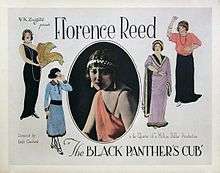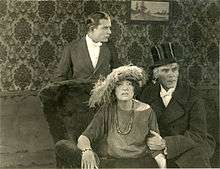The Black Panther's Cub
The Black Panther's Cub is a 1921 American silent melodrama film produced by William K. Ziegfeld, Florence Ziegfeld's younger brother. It stars stage actress Florence Reed in her last silent screen portrayal where she plays multiple roles. It is a lost film.[1][2]
| The Black Panther's Cub | |
|---|---|
 Film poster | |
| Directed by | Emile Chautard |
| Produced by | William F. Ziegfeld |
| Written by | Algernon Swinburne (poem: Faustine) Ethel Donoher (story) Philip Bartholomae (adaptation) |
| Starring | Florence Reed Earle Foxe Norman Trevor Henry Stephenson Tyrone Power, Sr. |
| Cinematography | Jacques Monteran - (French Wikipedia) Alfred Ortlieb |
Production company | Ziegfeld Cinema Corporation |
| Distributed by | Equity Pictures Corporation |
Release date |
|
Running time | 5 reels |
| Country | United States |
| Language | Silent (English intertitles) |

Plot
As summarized in a film publication,[3] when the law closes the Black Panther's (Reed) house, she gives her daughter into the keeping of her old friend Clive (Stephenson). Clive dies and the Cub (Reed), now a young lady, learns who her mother was. Lord Maudsley (Foxe), Clive's son, is in financial difficulty. He makes the Cub believe that dead benefactor has left large debts, and persuades her to reopen her mother's establishment to obtain the money. She does, and the former admirers of the Black Panther marvel at the way she has retained her youth. Eventually the Cub meets her mother (Reed), now an old woman, in a dive to which the Cub has fled with an admirer to get away from the man she loved, but feared to face in her new existence. The place is raided and the mother is shot. Later Maudsley admits that it was he who needed the money, and the lover forgives the Cub and they are happy together.
Cast
- Florence Reed as The Black Panther / Mary Maudsley / Faustine
- Norman Trevor as Sir Marling Grayham
- Henry Stephenson as Clive, Earl of Maudsley
- Paul Doucet as Victim of Chance (credited as Paul Ducet)
- Don Merrifield as Sir Charles Beresford
- Henry Carvill as Lord Whitford
- Louis R. Grisel as Butler (credited as Louis Grisel)
- Earle Foxe as Lord Maudsley
- William Roselle as Hampton Grayham
- Paula Shay as Evelyn Grayham
- Halbert Brown as Mr. Laird
- Charles Jackson as Stable Boy
- Ernest Lambart as Money Lender
- Frank DeVernon as Philanthropist
- Tyrone Power, Sr. as Count Boris Orliff (credited as Tyrone Power)
Reception
One review found the film to be good but complained of a scene where Reed's character was attacked and her bodice was entirely ripped off, saying, what was the use of showing this rather than implying it when the film censors would just cut it?[3]
References
- The American Film Institute Catalog Feature Films: 1921-30 by The American Film Institute, c. 1971
- The Library of Congress American Silent Feature Film Survival Catalog: The Black Panther's Cub
- "The Black Panther's Cub: Star's Acting Is the Real Feature of This One". Film Daily. New York City: Wyd's Films and Film Folks, Inc. 15 (48): 5. February 20, 1921. Retrieved March 12, 2014.
External links
| Wikimedia Commons has media related to The Black Panther's Cub. |
- The Black Panther's Cub on IMDb
- Synopsis at AllMovie
- original lobby poster(archived)